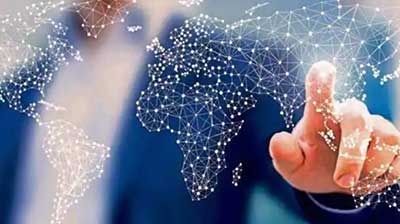Relevance: GS-1: Effects of Globalization on Indian society.
Key Phrases: Oxfam, GFC (2008), Global Recession, a resurgence of nationalism which rode on chauvinistic sentiments;
Context
- Globalisation has been present from the time humans got curious about other humans. But it got a real surge in the 1980s.
- In these 4 decades, it has encountered numerous Political and Economical challenges.
Key Highlights
Challenges to Globalisation
Economic Challenges
- The era of globalisation saw a significant rise in income
inequalities.
- 71% of the world’s population live in countries where inequalities have grown.
- The distribution of wealth became unequal.
- As per Oxfam, in 2018, 26 billionaires held as much wealth as half of the population.
- The prosperity created by globalisation was captured by a few.
- Technological growth has remained restricted to the west with cheap goods being purchased by the rest of the world.
- The production has been shifted to places with cheap labour but the
design and the planning have remained restricted to the west.
- Eg. Nike shoes are designed in the US but are manufactured in Bangladesh and China.
- The Global Financial Crisis (GFC) of 2008 due to financial
liberalization had a wide-ranging impact on the world economy. It led to
- Contraction in international trade and investment flows.
- Volatility in capital flows.
- The Global recession which followed GFC handicapped the global growth.
- The unemployment rate skyrocketed.
- The growth rate of advanced economies dwindled.
- As governments were sensitive to perceptions in international financial markets, they preferred to balance the budget and manage inflation than taking a bullish approach to fiscal spending.
Political Challenges
- Political backlash toward the economic consequences of the GFC led to a
resurgence of nationalism which rode on chauvinistic sentiments. This
can be seen in
- Rise of Marie Le Pen in France
- The victory of Jair Bolsonaro in Brazil, and Donald Trump in the US.
- In Industrialised countries - Politicians exploited fears about
- Immigrants stealing jobs.
- Dilution of their culture.
- In developing countries, Politicians exploited economic inequalities, social divides and ethnic or religious identities to challenge or oust incumbent governments.
- Apart from this, Globalisation has required someone to set the rules to
facilitate free trade.
- Until 2010, it was performed by the US, but since then China has used globalisation and trade to its advantage to grow, first economically and then geopolitically.
- The position of the rule-setter of globalisation has been challenged which can negatively affect the current rules causing further conflicts, as seen in the trade wars between US and China.
Different periods of Globalisation
- The earliest wave of globalization
- Started with the Mongol Empire and its raid around the world.
- Ended in 1350 when they brought plague germs to Europe, which killed one-third of the population of Europe.
- The next wave of globalization
- Started with the age of mercantilism.
- Ended in 1810 due to Napoleonic Wars.
- The preceding epoch of globalization
- Started with the age of empire (Colonialism).
- Ended in 1914 with World War I.
The spread of COVID and the rise of protectionism
- Globalisation and the inter-connected economy resulted in the quick spread of the COVID pandemic.
- As countries closed their borders, Protectionism and Import substitution became the mantra.
- A serious disruption in integrated global production networks was observed.
- Companies have started discussing shifting the production systems back to their home countries as uncertainties and disruptions of supply linkages have become a new reality.
Russia-Ukraine War and threat to Globalisation
- The war has led to volatility in Fuel and Food Prices. This has caused dependent economies to think about the burden of Globalisation.
- Russia and Ukraine are important sources of supply for wheat, maize and edible oils in the world market, while Russia is a primary source of oil and natural gas.
- The war might be localized, but the continuing conflict has created global ripples.
India’s experience with globalisation
Positive impacts
- Liberalization has increased choices available to consumers, thereby
increasing ease of living apart from a steady growth rate.
- In the pre-1990s India grew at 5.3%
- During 1991-2005-06, it grew at 6.1%
- Post 2005-06, it has grown at 8.5%
- Innovation in the economy has increased
- India has the 3rd largest start-up ecosystem.
- Revolution in the IT and Telecom Sector
- This has made India a service exporting economy.
- Increase access to health technology
- Access to modern machines and technology of transfer has caused important medical devices to be available at an affordable rate.
- It has also led to the development of medical tourism.
- It has liberalized our attitudes and caused changes in our prejudices and biases.
Negative Impacts
- Vulnerability to global economic shocks has increased
- Eg East Asian Crisis(1997), GFC (2008)
- Failure of domestic companies to face stiff competition from
technologically superior companies
- Eg Ambassador cars, BSNL
- Loss in revenues due to decrease in custom tariffs.
- Failure to get similar treatment for its goods due to non-tariff
barriers
- E.g Turkey refused the consignment of Indian wheat this year.
- Increased consumerism in Indians has been observed.
Conclusion
- Globalisation is here to stay may be in its current form or in some transformed form. India’s aim to become Atma-nirbhar is a sign of acceptance of the new form of globalisation, in which India utilises the benefits of globalisation and addresses its concerns to its advantage.
Source: Live-Mint
Mains Question:
Q. What is Globalisation? What have been different challenges faced by globalisation in modern times?







